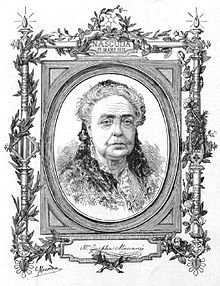María Josefa Massanés
The poetic work of Massanés is characterized by the diversity of themes, love, homeland, religion, social criticism, the situation of women, as well as the precise formal richness.
However, when the poet was five years old, her mother died, leaving her in the care of her paternal grandparents, who were people of deep-rooted customs and patriarchal thinking, so they did not make it easy for María Josefa Massanés when she showed interest in studying.
), the poem Himno Guerrero (also published in El Vapor, on September 25, 1835), which addressed political and territorial issues, both considered at the time properly masculine matters.
The poem that follows these in chronological order is A la incomparable doña Matilde Diez de Romea, already signed with her full name.
In Madrid she experienced a very prolific period, in which we find works such as La voz de Dios (El Reflejo, March 9, 1843), Oh padre mío!
Her first publication in Catalan began with the collection formed by Antonio de Bofarull Los Trobadòrs nous[9] (1858), in which Als meus estimats fillets adoptius.
The following year he appears in Los Trovadors moderns[10] (1859) with the poems Las donas catalanas and La Creu del terme.
From this date until her death, she continued her creative work in parallel, using both languages, and publishing in both Spanish and Catalan press and magazines.
The author's third poetic stage is gathered in an unpublished form in the book Frutos de otoño (Autumn Fruits).
